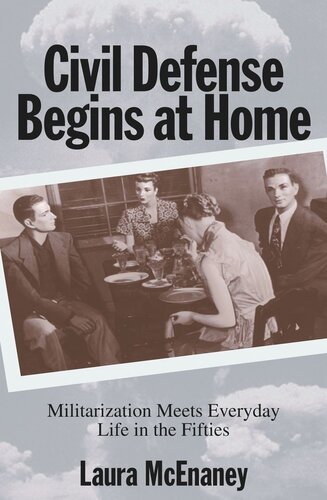

Most ebook files are in PDF format, so you can easily read them using various software such as Foxit Reader or directly on the Google Chrome browser.
Some ebook files are released by publishers in other formats such as .awz, .mobi, .epub, .fb2, etc. You may need to install specific software to read these formats on mobile/PC, such as Calibre.
Please read the tutorial at this link: https://ebookbell.com/faq
We offer FREE conversion to the popular formats you request; however, this may take some time. Therefore, right after payment, please email us, and we will try to provide the service as quickly as possible.
For some exceptional file formats or broken links (if any), please refrain from opening any disputes. Instead, email us first, and we will try to assist within a maximum of 6 hours.
EbookBell Team

4.4
32 reviewsDad built a bomb shelter in the backyard, Mom stocked the survival kit in the basement, and the kids practiced ducking under their desks at school. This was family life in the new era of the A-bomb. This was civil defense. In this provocative work of social and political history, Laura McEnaney takes us into the secretive world of defense planners and the homes of ordinary citizens to explore how postwar civil defense turned the front lawn into the front line. The reliance on atomic weaponry as a centerpiece of U.S. foreign policy cast a mushroom cloud over everyday life. American citizens now had to imagine a new kind of war, one in which they were both combatants and targets. It was the Federal Civil Defense Administration's job to encourage citizens to adapt to their nuclear present and future.
As McEnaney demonstrates, the creation of a civil defense program produced new dilemmas about the degree to which civilian society should be militarized to defend itself against internal and external threats. Conflicts arose about the relative responsibilities of state and citizen to fund and implement a home-front security program. The defense establishment's resolution was to popularize and privatize military preparedness. The doctrine of "self-help" defense demanded that citizens become autonomous rather than rely on the federal government for protection. Families would reconstitute themselves as paramilitary units that could quash subversion from within and absorb attack from without.
Because it solicited an unprecedented degree of popular involvement, the FCDA offers a unique opportunity to explore how average citizens, community leaders, and elected officials both participated in and resisted the creation of the national security state. Drawing on a wide variety of archival sources, McEnaney uncovers the broad range of responses to this militarization of daily life and reveals how government planners and ordinary people negotiated their way at the dawn of the atomic age. Her work sheds new light on the important postwar debate about what total military preparedness would actually mean for American society.